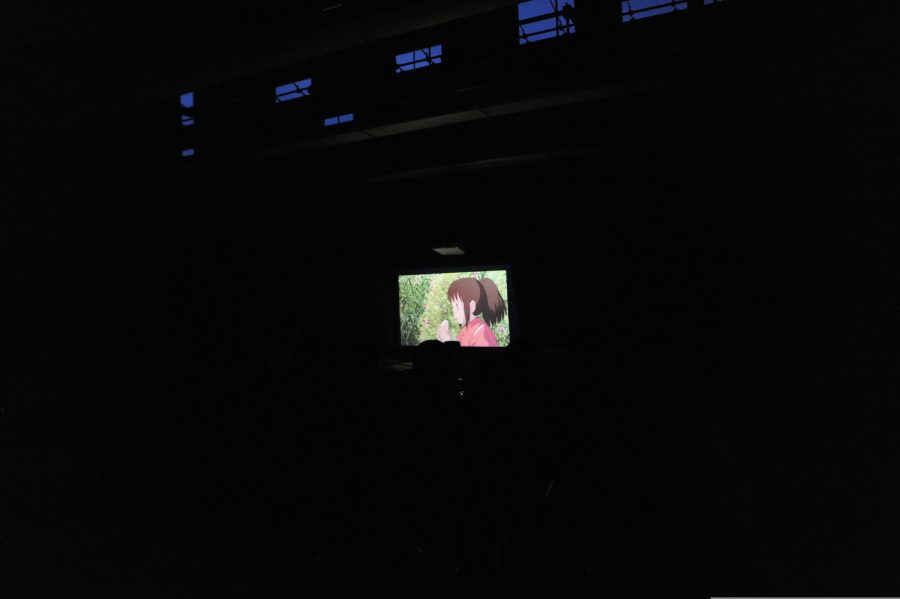Cancellations and Delays in the Entertainment Industry the Era of COVID-19
While the pandemic has given people more free time to enjoy new media, it has also greatly effected the entertainment industry’s ability to release new media content.
Students in the East Asian Entertainment Club watch a classic film, one example of a great way to stay entertained during quarantine, since films can be streamed at home.
The effects of the Coronavirus pandemic are omnipresent right now. As a result, most people are spending lots of time stuck inside with endless free time, and not much available to do with it. The silver lining of that would be the near-infinite pool of TV, movies, music, and games with which to entertain yourself. The problem with this is that a slew of cancellations has shrunk the amount of content available. It is clear that with the virus at large, it would be impossible to continue normal production of the aforementioned forms of media. However, the number of people sequestered indoors has pressured many companies to take measures to capitalize on this by releasing new media content whatever they can.
The most unambiguous effect of the virus, and more specifically social distancing, has been on Hollywood. The vast majority of people worldwide are not invested nearly enough in cinema, to now agree to pack into a crowded theater where the likelihood of becoming infected would be immense. Theatrical releases are instrumental to the success of new films, so even completed projects have been essentially canceled across the board. Examples include the newest installment in ‘The Fast and the Furious’ franchise, and the anticipated sequel to ‘A Quiet Place.’ The new James Bond film has been rescheduled for a November 2020 release, and Disney has pushed back the release date to ‘Black Widow’ to November 6, 2020 at the time of writing. Those are only a fraction of the films that have been affected by the Coronavirus pandemic.
Blockbusters such as ‘Black Widow,’ ‘Wonder Woman 2,’ and ‘Mulan’ had begun marketing, and are technically in the midst of what should be constant advertising to ensure a large audience. As a result of changes to release dates, it is very likely the public will forget about these upcoming projects to a large extent. However, imminent changes to strategy may mitigate this effect. For example, Disney will try to restart the marketing cycle for Black Widow now that they have a tentative future release date.
Television presents a much more varied story, as the distribution of shows has not been stunted to the same extent as in the film industry. In this case, T.V. has an advantage. Since people have more time to watch television during the day, there is an increase in the number of decent time slots on cable and an increase in revenue for streaming services like Netflix and Hulu. In terms of cable television, one thing to predict would be frequent reruns, especially of discontinued series.
Universally, film sets for television and movies have had to close over virus concerns. One specific issue with closing for safety is stopped shows having issues continuing production post-quarantine. Notably, the show ‘Empire’ had to cancel its series finale, and it is very unlikely that when filming studios open up, the show will be given time to conclude.
In the gaming industry, similar indefinite delays have already begun to take place. Hotly anticipated titles like ‘The Last of Us 2’ have fallen victim, and more delayed releases are sure to follow. The pandemic is sure to have a larger effect on the major ‘AAA’ game studios and publishers than their indie equivalents, however. It is not an unusual practice for smaller games to be developed by small groups, which often also did not have offices from which to work; they had already been ‘working from home’ before the Coronavirus pandemic hit. Video game consoles have also been uniquely placed in a precarious position, as supply shortages are making acquiring a new console essentially impossible at this time.
Bronx Science students expressed their frustration with a wide variety of cancellations. One example was the standout CW superhero series ‘The Flash.’ Abir Hossain ’21 said, “The Flash series will be reduced in number of episodes.” Kellen Knight ’21 said, “The Katowice playoffs were closed to audiences,” in reference to a major event in competitive ‘Counter Strike: Global Offensive,’ a popular online first person military shooter video game. Multiple students also mentioned the delay of the second season of ‘Euphoria,’ and the anime series ‘Haikyuu.’
During these unusual times, there are going to be any noticeable changes to how media is distributed and produced, and while it might be hard to find ways to pass the time, the amount of entertainment already available should help to mitigate the boredom.
A slew of cancellations has shrunk the amount of media content that is available for consumption during quarantine.
Declan Hilfers is an Editor-in-Chief and Staff Reporter for ‘The Science Survey.’ He is attracted to journalism because it presents an outlet to bring...
Spencer McQuaig is the Section Editor for Arts and Entertainment for ‘The Science Survey.’ As A&E editor, he is responsible for editing all of...

